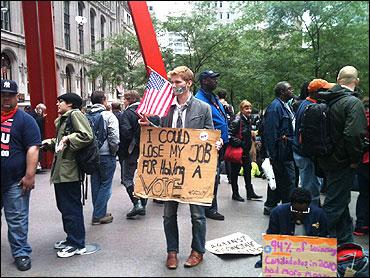
What does the intensifying Occupy Wall Street protest mean for India?
As the agitation, which claims to speak for 99 per cent Americans, spreads to many cities across the United States of America it is evoking a range of responses here -- from admiration to scorn.
It resonates powerfully with ground level struggles in India against both large corporations and government policies that give priority to profits while undermining social and environmental well-being.
But those who believe that a dynamic and rapidly expanding financial market is essential for India's prosperity are dismissive of what they see as a rudderless protest. What India needs, they argue, is more not less of financial markets.
Both extremes are faithful to their own experience of reality. And yet both are partly wrong.
. . .
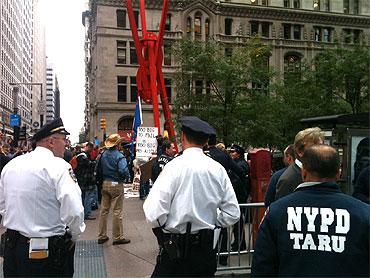
Activists who condemn financial markets as being inherently evil ignore the role that this mechanism can play in pumping money and resources to produce the goods and services that some people take for granted and others aspire to have.
Proponents of financial markets who ignore the social and environmental damage done by giving supreme importance to money-profits are even more wrong.
So what is the alternative? Curiously, both these opponents tend to be equally passionate in posing this question.
They might also be united in saying that the American experience is unique and has little or no bearing on our struggles and strivings in India.
True that India's 'emergence' as a fully capitalist market economy is not quite complete but some of the core issues that are being highlighted by the Occupy Wall Street protestors are deeply relevant for us.
. . .
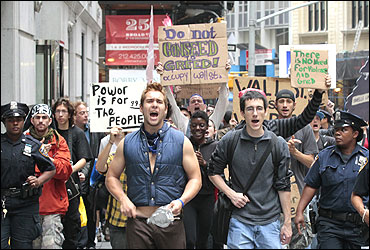
First of all the protest now unfolding on Wall Street is a call to occupy and reclaim the financial markets not demolish them.
This demand is driven primarily by two mega-trends in the US. One is the delinking of financial markets from the productive economy on which every-day life depends.
The other is concentration of wealth in the hands of a few. The most frequently repeated slogan at the Wall Street protest is that 1 per cent of Americans now own 99 per cent of the wealth -- which may not be literally accurate but is true in spirit.
Reclaiming markets is essentially about ensuring that social priorities -- ethical and material -- become more powerful than corporate interests. This is also a push against 'regulatory capture' -- a term made famous by the Indian economist Raghuram Rajan.
It refers to a condition, common across the world, where powerful private interests manipulate or control regulation to make it work in their own favor to the detriment of people at large.
. . .
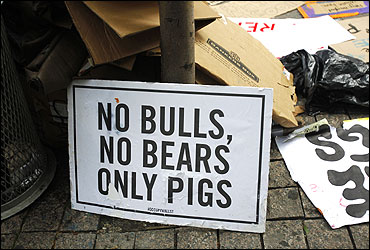
But just how do people in any country reclaim financial markets?
There are multiple answers to that question based on actual work that is being done both at think-tanks and on the ground -- by socially engaged business people and by market-sensitive activists.
By way of illustrations let us look at just two examples -- one from the US and one from India.
Shareholder activist Robert A G Monks of Boston has been at the forefront of a struggle to make companies more accountable both to shareholders and stakeholders.
Monks, now in his 70s, was educated at Harvard Law School, has been an entrepreneur, is one of the founder trustees of the Federal Employees' Retirement System and the author of a book titled 'Corpocracy'.
Monks is now widely known for his campaigns to make corporations conform to democratic norms – both by enabling more shareholder participation and being more socially responsible in their operations.
. . .
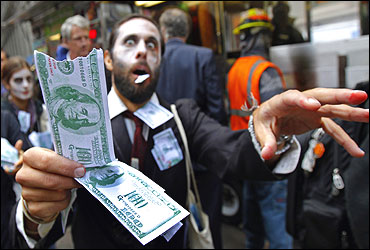
However, over the last two years Monks' blog has become increasingly gloomy and reported that this struggle is becoming more and more difficult.
Last year the United States Supreme Court validated changes in campaign finance laws which will make corporations much more powerful.
Monks is among those who now believe that the structure and functioning of the Securities and Exchange Commission must be reviewed and thoroughly overhauled -- because it has failed to protect shareholder rights. Shareholder activists like Monks aim to promote 'responsible ownership'.
On a different tangent is an upcoming meeting in Bangalore on 'Participative Capital', organized by ACCORD.
This Tamil Nadu based NGO is the promoter of Just Change – a cooperative of producers, consumers and investors. Apart from facilitating fair trade overseas the Just Change India Producer Company has linked a number of small producers and consumers to trade with each other within India.
. . .

ACCORD is now attempting to break away from the traditional mode of mainstream capital investment where ownership rights are solely vested with the investor.
"Our concept of Participative Capital is based on investors being only participants and therefore having only participative rights along with producers and consumers" says a statement from ACCORD.
Participative Capital is being defined as distinct from conventional investment or mercantile capital. Despite the emergence of a "triple bottom line" approach investment is still dominated by the money profit motive.
Social objectives are addressed through philanthropy or corporate social responsibility (CSR). By contrast Participative Capital would make the provider of capital an equal partner of producers and consumers.
All the actors would share the risk and responsibility to ensure a more just economic system. Sharing benefits would be based on the degree of participation and economic justice realized.
. . .
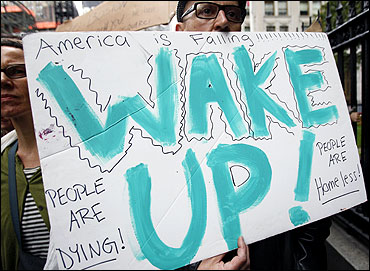
That may sound like a lofty, even dreamy, goal. But the conference planned for November 11th is sponsored by corporate giants including Infosys, DBS, Orix, BASF, NEC and BSN.
Such concepts may be little more than acorns at present. But properly planted they could grow into lush, strong trees.
The immediate outcome of the Occupy Wall Street protest is difficult to assess or predict. But it would have served a vital function if it draws more people into looking at the various different ways in which the failings of the prevailing financial system are being addressed.